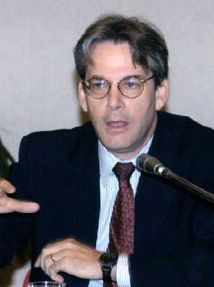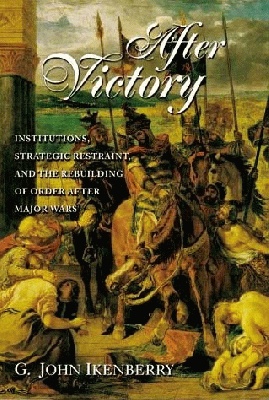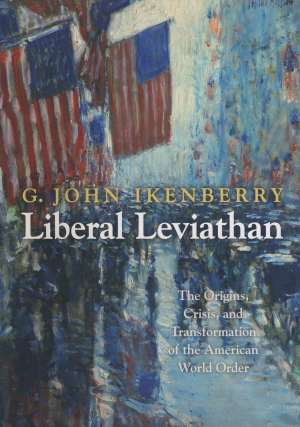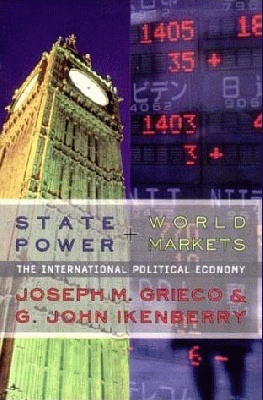

Gilford John Ikenberry
* 05.10.1954
text
text
text
te
US-amerikanischer Politikwissenschaftler, Vertreter des ökonomischen Realismus, Neorealismus
Werdegang
Studium am Manchester College in North Manchester, Indiana
1976: B.S. in Politikwissenschaft und Philosophie
1978: M.A. in Politikwissenschaft an der University of Chicago, 1978
1985: Ph.D. an der University of Chicago in Chicago, Illinois
1984-1992: Assistenzprofessur an der Princeton University in Princeton, New Jersey
1991-1992: Mitarbeiter des US-Außenministeriums (Policy Planning)
1992-1993: Mitarbeiter der Carnegie Endowment for International Peace
1994-2000: Dozent an der University of Pennsylvania in in Philadelphia, Pennsylvania
2000-2004: Peter F. Krogh Professor of Geopolitics and Global Justice an der Edmund A. Walsh School of Foreign Service, Georgetown University, Washington, D.C.
seit 2004: Albert G. Milbank Professor of Politics and International Affairs an der Princeton University in Princeton, New Jersey
1997-1998: Hitachi International Affairs Fellow
1998-1999: Fellow at the Woodrow Wilson International Center for Scholars in Washington D.C.
2002-2004: Transatlantic Fellow at the German Marshall Fund
2002: Schroeder-Jervis Award der American Political Science Association (APSA) für After Victory: Institutions, Strategic Restraint, and the Rebuilding of Order after Major Wars
Bücher:
After Victory: Institutions, Strategic Restraint, and the Rebuilding of Order after Major Wars. Princeton: Princeton University Press 2001.
Liberal Leviathan. The Origins, Crisis, and Transformation of the American World Order. Princeton: Princeton University Press 2008.

Herausgeberschaften:
The State. Minneapolis: University of Minnesota Press 1989.
Reasons of State: Oil Politics and the Capacities of American Government. Ithaca: Cornell University Press 1988.
After Victory: Institutions, Strategic Restraint, and the Rebuilding of Order after Major Wars. Princeton: Princeton University Press 1988.
Liberal Order and Imperial Ambition: American Power and International Order. Cambridge: Polity Press 2005
America Unrivaled: The Future of the Balance of Power. Ithaca u.a.: Cornell University Press 2002.
mit Joseph M. Grieco
State Power and World Markets: The International Political Economy. New York u. a.: Norton 2003.
 mit Michael Mastanduno
mit Michael Mastanduno
International Relations Theory and the Asia-Pacific. New York u. a.: Columbia University Press 2003.
mit Takashi Inoguchi
Reinventing the Alliance: U.S.-Japan Security Partnership in an Era of Change. New York u. a.: Palgrave Macmillan 2003.
American Foreign Policy: Theoretical Essays. New York, NY u..: Longman 2005.
mit Takashi Inoguchi
The Uses of Institutions: The U.S., Japan, and Governance in East Asia. New York: Palgrave Macmillan 2006.
Aufsätze:
The Irony of State Strength: Comparative Responses to the Oil Shocks in the 1970s. In: International Organization 40.1986, 1. S. 105-137.
The State and Strategies of International Adjustment. In: World Politics 39.1986, 1. S. 53-77.
mit Theda Skocpol
Expanding Social Benefits: The Role of Social Security. In: Political Science Quarterly 102.1987, 3. S. 389-416.
Market Solutions for State Problems: The International and Domestic Politics of American Oil Decontrol. In: International Organization 42.1988, 1. S. 151-177.
mit David A. Lake; Michael Mastanduno
Introduction: Approaches to Explaining American Foreign Economic Policy. In: International Organization 42.1988, 1. S. 1-14.
Conclusion: An Institutional Approach to American Foreign Economic Policy. In: International Organization 42.1988, 1. S. 219-243.
Manufacturing Consensus: The Institutionalization of American Private Interests in the Tokyo Trade Round. In: Comparative Politics 21.1989, 3. S. 289-305.
Rethinking the Origins of American Hegemony. In: Political Science Quarterly 104.1989, 3. S. 375-400.
mit Michael Mastanduno und David A. Lake
Toward a Realist Theory of State Action. In: International Studies Quarterly 33.1989, 4. S. 457-474.
mit Charles A. Kupchan
Socialization and Hegemonic Power. In: International Organization 44.1990, 3. S. 283-315.
mit Daniel Deudney
The International Sources of Soviet Change. In: International Security 16.1991, 3. S. 74-118.
A World Economy Restored: Expert Consensus and the Anglo-American Postwar Settlement. In: International Organization 46.1992, 1. S. 289-321.
mit Daniel Deudney
Who Won the Cold War? In: Foreign Policy Nr. 87, 1992. S. 123-138.
Salvaging the G-7. In: Foreign Affairs 72.1993, 2. S.132-139.
mit Daniel Deudney
After the Long War. In: Foreign Policy Nr. 94, 1994. S. 21-35.
The Future of International Leadership. In: Political Science Quarterly 111.1996, 3. S. 385-402.
The Intertwining of Domestic and International Politics. In: Polity 29.1996, 2. S. 293-298.
Globalization and the Stability of World Order. In: Asia Pacific Review 5.1998, 3. S.1-13.
Institutions, Strategic Restraint, and the Persistence of American Postwar Order. In: International Security 23.1998, 3. S. 43-78.
The Myth of Post-Cold War Chaos. In: Foreign Affairs 78.1999, 2. S. 35-49.
American Grand Strategy in the Age of Terror. In: O'Day, Alan (Hrsg.): War on Terrorism. Aldershot: Ashgate 2002. S. 195-210.
Is American Multilateralism in Decline? In: Perspectives on Politics 1.2003, 3. S. 533-550.
SG